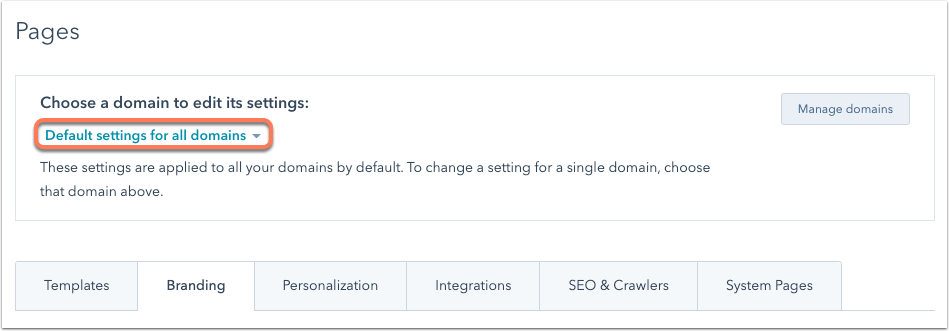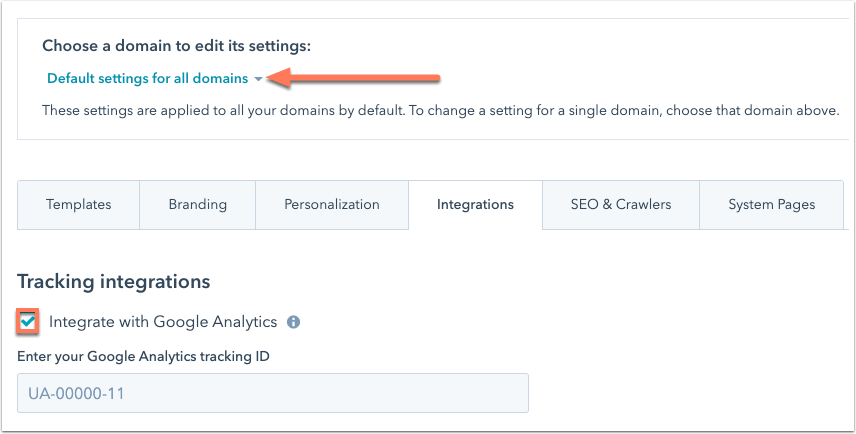When it comes to reporting a campaign’s performance, understanding the actual Return On Investment(ROI) is a struggle for many marketers. Today, it has become critical to analyze your data for informed business decisions. For significant insights, all major Customer Relationship Management (CRM) platforms, such as HubSpot and Salesforce, rely on Data Analytics. For this purpose, Google Analytics is the most popular choice among businesses. This post will walk you through the steps to link your Google Analytics and Hubspot.
There are many ways you can integrate Google Analytics and Hubspot. In this post, you will learn how to connect your Google Analytics and Hubspot using Google Analytics Tracking ID. So, follow the underlying steps to set up your integration:
Step 1: First, log in to your HubSpot account. Then from the main bar on the top, click on the Settings icon as shown below.

Step 2: Now, go to your left sidebar and click on “Website” and then “Pages”. Step 3: Next, click the “Choose a domain to edit its settings” menu and select a “Domain”.
Step 4: Make sure you select the “Default Settings for all Domains” to apply tracking to all the HubSpot content as shown below.

Step 5: Next, click the “Integrations” tab and then select the “Integrate with Google Analytics” from the Tracking Integrations tab as shown below.

Step 6: Below the checkbox, you will find the field to enter the Google Analytics tracking ID. Enter your Google Analytics Tracking ID here as shown above.
Step 7: After entering all the details and configuring all options, click on “Save”.
Linking your Google Analytics Account with HubSpot using the Google Analytics Tracking ID is one of the methods. However, there are other robust methods you can leverage to integrate your Google Analytics and HubSpot. To learn more about these methods in detail, you can refer to the Google Analytics and HubSpot Integration: 3 Easy Methods blog.
Benefits of Integrating Google Analytics and HubSpot
There are numerous important reasons why leveraging Google Analytics with HubSpot might be beneficial. While HubSpot has many tools geared towards Sales and Marketing, Google Analytics can provide useful insights into the same data to assist fine-tune marketing tactics. Let’s take a look at some of the advantages of integrating Google Analytics and HubSpot.
- 360-degree overview of Marketing Performance: By merging data from both platforms, you can monitor your whole marketing and sales performance in one place. You can deep dive into your data more thoroughly to see what aspects of your website/campaign are doing effectively and where you should concentrate your efforts.
- Detailed Analysis: You can review and report on the whole customer experience from start to end on a single platform by merging your HubSpot and Google Analytics data.
- A Comprehensive Analysis of Channel Performance: You can gain a better picture of how your efforts convert across channels by combining data from HubSpot and Google Analytics, as well as data from other social media sites. You can compare the performance of different campaigns inside each channel, as well as across numerous channels. This data can help you determine which channels would provide the most return on investment for your campaigns, allowing you to budget accordingly.
- Easily Create Customized Sales & Marketing Reports: You can generate tailored reports that communicate better stories with your data by combining data from HubSpot and Google Analytics. You will have access to all of the data at once, and you’d be able to build complete-funnel reports.
Conclusion
By the end of this post, you might have gained a basic understanding of the benefits offered by the Google Analytics and HubSpot integration. In this post, you also learned the key steps to set up Google Analytics and HubSpot using the Google Analytics Tracking ID.
If you are dealing with data that is dynamic and prone to constant change, then you can leverage automated data pipelines such as Hevo. Hevo is a No-code Data Pipeline that supports pre-built integrations from 100+ data sources including 40+ Free sources like
Google Analytics, HubSpot, etc. Hevo enables you to move data from any source to your desired data destination in a fully automated and safe way without writing any code. It will simplify your Data Pipelines and make data migration a breeze.
Read also: How Does Kafka Handle Exactly-once Semantics?

